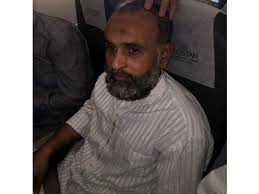
(Credit: tribune.com.pk)
Islamabad, Nov 26 – A founder of a Pakistani terror group has been shot dead in the middle of Lahore, in an incident that senior police sources privately admitted was a killing staged by the authorities.
Haroon Bhatti, who was extradited from Dubai in September, was killed while in police custody, along with three other members of Lashkar-e-Jhangvi (LeJ). LeJ has a track record of attacks on Pakistan’s Shia minority, and intelligence officials feared it could join forces with Islamic State.
Lahore police said the men were “hardcore terrorists” involved in dozens of sectarian killings as well as the kidnapping in 2011 of Warren Weinstein, a US aid worker who was accidentally killed in a US drone strike this year.
In the official version of events, Bhatti led police to an abandoned plastic-bag factory where LeJ militants were hiding. The militants opened fire at about 12.30am, leaving Bhatti and three others dead but not injuring any police.
Residents in the Badami Bagh area said police cordoned off the small factory building during the midnight raid and that gunfire could be heard for about an hour.
Police photos of the scene showed the men lying dead in a simple concrete building, some with weapons nearby. The hands of Bhatti’s body remained bound with handcuffs. The factory’s bullet-riddled gate suggested all the gunfire had been directed into the building.
Speaking privately, three police officials told the Guardian that the “encounter” was deliberately staged to get rid of militants that Pakistan’s enfeebled judicial system would never have prosecuted.
“This had to be done to maintain peace in the province,” said a Lahore-based officer. “No one would have given evidence against them because witnesses would be brutally targeted. You can’t allow terrorists to carry on their attacks just because you don’t have any proof against them.”
So-called police “encounters” are common practice in Pakistan, and Wednesday’s incident mirrors the death in July of LeJ’s former leader Malik Ishaq and 13 of his followers in an isolated area near the town of Muzaffargarh. Ishaq was killed in a gun battle that supposedly erupted while police were taking him to identify an arms cache.
The extreme measures taken against LeJ underline a profound change of attitude on the part of the Pakistani state towards some of the country’s militant groups. In the past Ishaq had been able to act with near impunity because violent Islamist groups such as LeJ were part of the wider network of jihadi groups encouraged to fight in Afghanistan in the 1980s. In the last 18 months, however, the state has set out to crush those groups that have turned their guns on domestic targets, including religious minorities.
Khaled Ahmed, a longstanding critic of the security establishment’s use of jihadi groups, said the killings in Lahore were a significant development. “A decision has been made by the army to act against these elements who have been always attached to the army in the past,” he said, crediting the policy change to Raheel Sharif, the general who took command of Pakistan’s all-powerful army in 2013. “I think this general is all for shutting shop on these non-state actors.”
In July intelligence chiefs warned the government that LeJ was poised for a potential merger with Isis, which has not yet been able to develop a firm support base in Pakistan.
Analysts say Pakistan’s civilian government backs the tough stance against LeJ despite fears in the past of provoking an organisation with a powerful base in Punjab, the province from where the ruling Pakistan Muslim League draws most of its support.
A leading figure in the party, the Punjab home minister Shuja Khanzada, was killed in a bomb attack in April, widely seen as a revenge for the killing of Ishaq.
